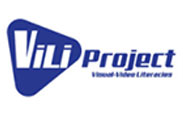
Vili Project
Project framework: Erasmus+/ Cooperation for innovation and the exchange of good practices
Action Type: Strategic Partnerships for higher education
Project Reference: 2016-1-UK01-KA203-024462
Duration: 2016-2018
Partners: LANCASTER UNIVERSITY (UK), DANUBE UNIVERSITY KREMS (Austria), CARDET (Cyprus), WIDE Services(Greece), EUROPALSA (Greece)
Website: https://mooc.viliproject.eu/, https://viliproject.eu/
Project Description
According to statistics there is a significant increase (40%) in people getting engaged in video production or just viewing videos. All forms of visuals such as Videographics (use of visual images), infographics (visual representations of data), Visual thinking strategies, video storytelling and Vlogs (video diaries/blogs) are areas of increasing interest, where especially executives and business people embrace non-text world and prefer to use non-text formats for a wide range of goals. This under researched visual area is rising in importance and competence in video and visual thinking is crucial for communication in education and business. In Higher Education(HE), the EU is lagging behind the rest of the world in modernisation and internationalisation, e.g. in the UK the biennial UCISA Technology Enhanced Learning survey (2014) found that Massive Open Online Courses (MOOCs) have made little impact on HE however, video recording of lectures is increasing. Video technologies are being increasingly used in online learning and particularly in MOOCs. MOOCs have great potential for opening up education and making it accessible to all irrespective of institutional boundaries, national borders, or educational context. The need for competences in video/visual thinking is increasing and especially useful for supporting dyslexic learners.
This gap mentioned will be the field for this project where will be thorough research of the current practice in the use of video/visual thinking strategies and will be combined with a review of literature to develop an innovative theory that encapsulates best practice and theory and draws from experience in multiple fields. Pedagogical materials will be developed based on this new theory and case studies that show how to improve knowledge representation or construction, exploiting the potential of visual/video thinking strategies. The use of video and visual thinking strategies in online learning and MOOCs will be promoted through the dissemination of OERs developed and evaluated using as channels two MOOCs on video/visual thinking strategies. A design based research methodology will be used to develop and evaluate the OERs and pedagogical materials and informed grounded theory methodology will be used to generate the innovative theory of best practice in video/visual thinking. Social media will be used to inform stakeholders and recruit participants to the MOOC. The MOOC will enable testing and evaluation to lead to refinement of the resources, as well as the creation of a supportive learning community that co-creates a WIKI of case studies to showcase examples and encourage re-use of resources.
General Project Objective
The ViLi project aims to improve the performance and efficiency of education and training by:
- Open educational resources (e.g. MOOC on video/visual literacies, WIKI, videos): Developing the competences of educators in video and visual thinking strategies, by delivering a MOOC that is open to all in e.g. vocational training, business and further education.
- Pedagogical materials: Supporting the opening up of education by providing pedagogical materials and open educational resources (OERs) developed and evaluated through two MOOCs on video/visual thinking strategies.
The pedagogical materials and OERs can be freely reused by educators, vocational trainers and those working in human resources. The supportive learning community and WIKI will help to ensure the sustainability of the resources produced. The potential impact will be the:
- Increased competences of educators in communication through video/visual literacies, and
- Support for the development and use of MOOCs within Europe through open educational resources and the MOOC on visual literacies.
- Papers in academic and practitioner conferences and journals that will open up further research and innovation on video/visual literacies and MOOCs in education.
- The stimulating lifelong learning and business communication, enhancing competitiveness and modernisation of HE, promoting education for all.


